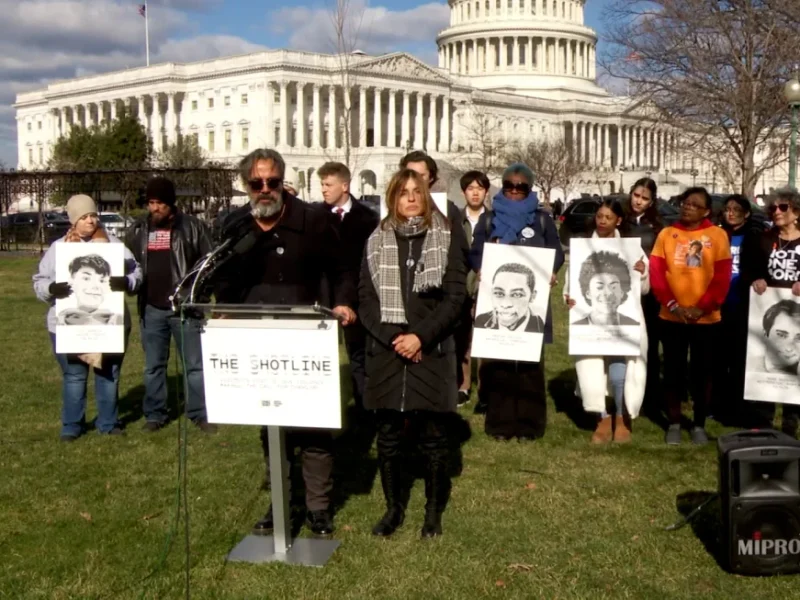On the sixth anniversary of his passing, Joaquin Oliver’s voice resonates through the corridors of Congress, emanating from his mother’s cellphone placed outside lawmakers’ office doors on Capitol Hill. The disembodied voice of the 17-year-old, a former student of Marjory Stoneman Douglas High School, delivers a poignant message.
“Six years ago, I was a senior at Parkland. Many students and teachers were tragically lost on Valentine’s Day that year due to gun violence perpetrated by an individual using an AR-15 assault rifle,” the voice conveys. “It’s been six years, and you’ve taken no action. Not a single step to prevent the ongoing shootings that continue to plague our nation.”
“The truth is, I perished that day in Parkland,” the voice persists. “My physical form was ravaged by a weapon designed for warfare. I speak to you now because my parents employed AI technology to replicate my voice, urging you to take action.”

Manuel and Patricia Oliver tragically lost their son, Joaquin, at the age of 17, in the devastating mass shooting that occurred at Marjory Stoneman Douglas High School in Parkland, Florida, in 2018. In memory of Joaquin and driven by their grief, they co-founded the organization Change the Ref. This organization has played a pivotal role in launching the new voice message campaign aimed at advocating for stricter gun control measures.
The audio message is one of six AI-generated voices representing young individuals who lost their lives to gun violence. This initiative is part of a new campaign launched by two advocacy groups, March For Our Lives and Change the Ref, aimed at urging lawmakers to take action on gun control.
Manuel Oliver, who co-founded Change the Ref in honor of his son after the tragic 2018 shooting in Florida, expressed frustration at the lack of progress in addressing gun violence. He stated, “My wife and I have been trying to use our voices for the last six years. Nonstop. We have tried almost every single way to approach gun violence in a way that people will pay attention. We haven’t been very successful. So we decided, you know what? Let’s bring the voices of our loved ones. Let’s bring the voice of Joaquin.”
One father listened repeatedly to the voice message of his son before eventually giving his approval and signing off on the campaign.
The new campaign’s website, named The Shotline, encourages individuals to listen to the voice messages, input their zip code, and then send calls to their respective members of Congress.
Coinciding with the campaign’s launch was a tragic mass shooting at a Super Bowl victory parade in Kansas City, resulting in one fatality and over 20 others injured, including children. This incident highlights the urgency of addressing gun violence. According to the Gun Violence Archive, there have been 50 mass shootings in the United States thus far this year.

Uziyah “Uzi” Garcia was a victim of the Uvalde shooting.
Uzi Garcia, aged 10, who tragically passed away in May 2022, is among the six children featured in the campaign.
In his AI-generated message, Uzi expresses his love for video games, telling jokes, making his friends laugh, and enjoying time on the trampoline with his family. He mentions being a fourth grader at Robb Elementary School in Uvalde, Texas, and reflects on the devastating day when a man armed with an AR-15 entered his school, resulting in the loss of 18 of his classmates, two teachers, and himself. Uzi’s father, Brett Cross, shared with CNN that he spent extensive time combing through old videos to capture Uzi’s voice for the campaign. He collaborated with the campaign’s technology team to ensure the pitch was accurate and listened repeatedly to Uzi’s AI-generated voice before providing his approval for its use.
Cross acknowledges the complexity of using the voices of deceased children to advocate for gun control, understanding that some individuals may find it troubling. Critics on social media have characterized the campaign as unethical and “ghoulish,” accusing Cross of exploiting his son to advance a gun control agenda. However, Cross maintains that he and other grieving families are compelled to find innovative ways to compel politicians to address the issue of gun violence, even if it means using unconventional methods. He emphasizes that while hearing Uzi’s voice again is bittersweet, he believes it’s necessary to ensure that his son’s voice is heard in the ongoing fight for change.

Brett Cross remains undeterred by critics who oppose the use of AI-generated voices of children lost to gun violence. “It was bittersweet because we get to hear his voice again,” he reflects on his son’s message. Despite facing criticism, Cross is steadfast in his belief that amplifying the voices of victims like his son is crucial in advocating for meaningful change to address gun violence.
Brett Cross expressed to CNN that he remains unfazed by the criticism surrounding the campaign. “If you think it’s uncomfortable hearing my son’s voice after he’s passed, imagine what it’s like to be us — to live with this every day,” he stated. Cross’s unwavering commitment to advocating for change underscores the profound impact of gun violence on families like his own.
Legal and ethical issues may arise from the use of AI-generated voices.
Since the initiative began, over 54,000 voice calls have been dispatched to legislators, as reported on The Shotline platform.
The campaign showcases four additional individuals affected by gun violence: Ethan Song, aged 15 from Connecticut, who tragically passed away in an accidental shooting in 2018; Akilah Dasilva, aged 23, who lost his life in a mass shooting incident in Tennessee in 2018; Mike Baughan, aged 30 from Maryland, who died by suicide in 2014; and Jaycee Webster, aged 20, who was fatally shot at his Maryland residence in 2017.
Manuel Oliver states that more than twenty-five other parents have provided recordings of their children’s voices for potential inclusion in future calls.
This campaign coincides with the swift advancements in AI technology, which have facilitated the replication of people’s appearances and voices, enabling scammers and malicious actors to disseminate deceptive messages.

Uzi Garcia was among those who fell victim to a tragic massacre in May 2022, during which 19 students and two teachers lost their lives at Robb Elementary School in Uvalde, Texas.
The Federal Communications Commission permits political prerecorded voice calls to landlines without prior consent. However, it recently declared that robocall scams utilizing AI-generated voices violate telecommunications law. This announcement followed an AI-generated robocall resembling President Biden, which circulated to New Hampshire voters before the state’s January primary, urging them to stay home.
According to Oliver, The Shotline’s messages are transmitted to lawmakers’ landlines, explicitly stating that the voices are AI-generated.
An expert noted that the parents are likely not infringing FCC regulations because they are transparent about their use of AI, and their intent is not fraudulent.
Quilici, CEO of YouMail, a robocall-blocking service, commented, “Think about the old ads that said ‘celebrity voice impersonated’ — we were all good with those.”
However, employing AI-generated voices of deceased individuals in a gun control campaign may provoke ethical concerns for some.
Wahl, an associate professor of computer science at Concordia University Wisconsin, emphasized the nuanced process involved in creating AI voices to ensure they closely match the original voice without sounding robotic.
Oliver acknowledged that some people may feel uneasy about the campaign’s use of AI-generated voices, noting that some parents who lost children to gun violence were hesitant to participate.
However, his aim is to provoke action on gun laws among members of Congress and others, even if it unsettles some individuals.
He emphasized the importance of using technology transparently to bring the voices of victims to light, stating, “If bringing the voice of a victim alive using technology in a transparent way … If that makes you feel uncomfortable, but you’re OK with kids getting shot at parades and schools, then something’s wrong with you.”











